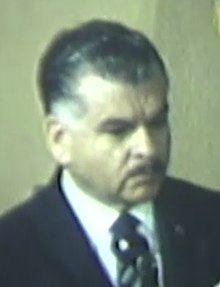Julio César Méndez Montenegro
Julio César Méndez Montenegro (born November 23, 1915 in Guatemala City , † April 30, 1996 ) was President of Guatemala from July 1, 1966 to June 30, 1970 .
Life
Julio César Méndez Montenegro was a cousin of César Montenegro Paniagua. Méndez attended the Liceo Guatemala. He studied law at the Universidad de San Carlos de Guatemala . He was one of the 13 university graduates who were brought to the President's Cuartel de la Guardia de Honor on the morning of October 20, 1944, as a kind of prisoner. There the commandant was killed, the barracks occupied and the Revolución de Octubre against General Juan Federico Ponce Vaidez successfully carried out.
Under Juan José Arévalo he was State Secretary in the Government Ministry, the Foreign Ministry and later Government Minister.
In the 1950s he was Professor and Dean of the Faculty of Law at the Universidad de San Carlos de Guatemala. He was chairman of the bar association. The Partido Revolucionario (PR) was founded in 1957 by Mario Méndez Montenegro. This was excluded from the presidential election in 1957 and by repeating in 1958 José Miguel Ramón Idígoras Fuentes became president. When Mario Méndez Montenegro was killed in an election campaign in October 1965 through the use of firearms , his brother Julio César Méndez Montenegro came back from exile to Guatemala and accepted the candidacy.
Under the government of Colonel Alfredo Enrique Peralta Azurdia, death squads appeared in Guatemala and hunted down, or whatever was believed to be, left officials. In this climate of fear, Julio César Méndez Montenegro was elected President. In the elections on March 6, 1966, Colonel Miguel Angel Ponciano Samayoa from the far-right Movimiento de Liberación Nacional (MLN) and Colonel Juan de Dios Aguilar de León from the ruling Partido Institucional Democrático (PID) went up against him. He received the relative majority of the votes with 45 percent. In parliament, Mendez received 35 votes out of 54.
He was a declared anti-communist and gave the military a free hand in asymmetrical warfare .
The Guatemalan Civil War continued during his tenure . It is believed that around 10,000 people lost their lives as a result of this during his tenure.
He appointed the journalist Clemente Marroquín Rojas as his deputy. Marroquín did not want to grant the military any right to intervene in his administration.
In 1965, June 30th was set as Army Day in memory of Justo Rufino Barrios , the founder of the Guatemalan Army . During the course of his government he declared a state of emergency .
The Méndez government negotiated with Exploraciones y Explotaciones Mineras de Izabal SA (Exmibal) about further concessions to mine nickel. A publication by the Chair of Economics at the Universidad de San Carlos de Guatemala in 1970 led to these negotiations being discontinued.
During his tenure, the Jurún Marinalá hydropower plant in the village of Agua Blanca, in the Finca el Salto, Departamento de Escuintla , which was started under Jacobo Arbenz Guzmán , was completed. Méndez appointed Miguel Ángel Asturias as Guatemala's ambassador to Paris. Asturias resigned from this post at the end of Méndez's term of office.
He was sent as ambassador to Mexico by his successor, General Carlos Arana Osorio . Méndez was buried on May 1, 1996.
Publications
- Article in the Revista de la Facultad de Ciencias Juridicas y Sociales de Guatemala 6 (9-12): 1960. "444 Años de Legislación Agraria, 1513-1957."
- Main author of Aspectos legales del problema de la tierra: época colonial
Individual evidence
- ↑ Andrew James Schlewitz, The rise of a military state in Guatemala, 1931-1966. New York: New School University. Unpublished dissertation, 1999. According to University San Diego, Elections and Events 1961-1980 ( Memento of the original from September 13, 2011 in the Internet Archive ) Info: The archive link was inserted automatically and has not yet been checked. Please check the original and archive link according to the instructions and then remove this notice.
- ^ Time , Mar. 18, 1966, Two for the Seesaw
- ^ Time , Mar. 16, 1970, A Step to the Right
- ^ Historical Clarification Commission , Texto del pacto suscrito entre el ejército de Guatemala y el Partido Revolucionario en 1966
- ↑ Centro Internacional para Investigaciones en Derechos Humanos, Organization y Represión en la Universidad de San Carlos, Guatemala, 1944 a 1996 ( Memento of September 9, 2007 in the Internet Archive )
- ↑ Time , Oct. 27, 1967, A Tendency of Commitment
| predecessor | Office | successor |
|---|---|---|
| Alfredo Enrique Peralta Azurdia |
President of Guatemala July 1, 1966–30. June 1970 |
Carlos Arana Osorio |
| personal data | |
|---|---|
| SURNAME | Méndez Montenegro, Julio César |
| BRIEF DESCRIPTION | Guatemalan President |
| DATE OF BIRTH | November 23, 1915 |
| PLACE OF BIRTH | Guatemala City |
| DATE OF DEATH | April 30, 1996 |
